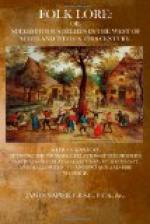Persons hearing a tingling sound in their ears, called the deid bells, expected news of the death of a friend or neighbour. A knock heard at the door of the patient’s room, and on opening no person being found, was a sure warning of approaching death. If the same thing occurred where there was no patient, it was a sign that some relation at a distance had died. I was sitting once in the house of a newly married couple, when a loud knock was heard upon the floor under a chair, as if some one had struck the floor with a flat piece of wood. The young wife removed the chair, and seeing nothing, remarked with some alarm, “It is hasty news of a death.” Next day she received word of the death of two of her brothers, soldiers in India, the deaths having occurred nearly a year before. There was no doubt in the mind of the young wife that the knock was a supernatural warning. The natural explanation probably was that the sound came from the chair, which being new, was liable to shrink at the joints for some time, and thus cause the sound heard. This cracking sound is quite common with new furniture.
If, again, some one were to catch a glimpse of a person whom they knew passing the door or window, and on looking outside were to find no such person there, this was a sign of the approaching death of the person seen. There were many instances quoted of the accuracy of this omen, instances generally of persons who, in good health at the time of their illusionary presence, died shortly after. Another form of this superstition was connected with those who were known to be seriously ill. Should the observer see what he felt convinced was the unwell person, say, walking along the street, and on looking round as the presence passed, see no person, this was a token of the death of the person whose spectre was seen. I knew of a person who, on going home from his work one evening, came suddenly upon an old man whom he knew to be bed-ridden, dressed as was formerly his wont, with knee breeches, blue coat, and red nightcap. Although he knew that the old man had for some time been confined to bed, so distinct was the illusion that he bid him “good night” in passing, but receiving no reply, looked behind and saw no one. Seized with fright, he ran home and told what he had seen. On the following morning it was known through the village that the old man was dead. And his death had taken place at the time when the young man had seen him on the previous evening. This was considered a remarkably clear instance of a person’s wraith or spirit being seen at the time of death. However, the seeing of a person’s wraith was not always an omen of death. There were certain rules observed in relation to wraiths, by which their meaning could be ascertained, but these rules differed in different localities. In my native village a wraith seen during morning, or before twelve noon, betokened that the person whose wraith was seen would be fortunate in life, or if unwell at the time, would




